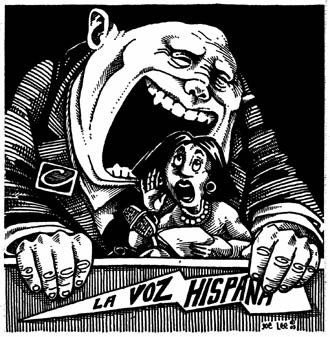Since the Telecommunications Act of 1996 flung open the barn doors of broadcast regulation, Clear Channel has executed a jackbooted
| Illustration by Joe Lee. |
Meanwhile, Univision operates a powerhouse conglomerate of three Spanish-language television networks, 32 local affiliates, and a growing record label.
The most striking similarity between Mays and Perenchio is that they're not easily satiated. At a time when high-profile Congressmen call for investigations into Clear Channel's media empire, and critics routinely bash Univision for their lowbrow programming, both companies are involved in a merger attempt that could radically reshape the Latino-media playing field.
On July 23, 2002, Univision and Hispanic Broadcasting Corporation - the nation's largest Spanish-language radio broadcasting company - filed a joint application with the Federal Communications Commission for Univision to buy HBC, in which Clear Channel has a financial interest. The application, which is still pending FCC approval, has incited Clear Channel and Univision haters to cry monopoly from all angles.
One of the big gripes concerns Entravision Communications, a Santa Monica, California-based radio/television company which owns television affiliates in 20 of the top 50 Hispanic markets in the United States, as well as 58 radio stations in 23 markets. Univision owns stock in Entravision, and also supplies Entravision stations with its programming material; thus, merger opponents argue that Entravision will be stymied in their attempts to compete with a Univision-owned Hispanic Broadcasting Company.
Merger opponents similarly point to Clear Channel's role as a major shareholder in Hispanic Broadcasting, and foresee Mays and Perenchio carving up the Latino media market between the two of them.
"They are going to control virtually the entire Hispanic market," says Arthur Belendiuk, attorney for the National Hispanic Policy Institute, an organization founded by New York State Senator Efrain Gonzales. "What you're going to have is a fairly homogenized Republican point of view. `Hispanics` are not going to be able to get another point of view, because where's it going to come from?"
Uncharacteristically, for such aggressive moguls, both Mays and Perenchio are hinging their cases on the power of passivity. Clear Channel reps insist that the conglomerate's role in Hispanic Broadcasting is a passive one, as a non-voting shareholder. Meanwhile, Univision - at the recent insistence of the Justice Department - agreed to reduce its share of Entravision stock from 32 to 10 percent.
"We'll be a passive investor in Entravision, and nothing more," says Univision spokeswoman Stephanie Pillersdorf. She adds that the deal "has been 100 percent between Univision and Hispanic Broadcasting, and Clear Channel has nothing to do with it."
Belendiuk, for one, isn't buying it. He insists that Randall Mays, Clear Channel CFO and Lowry Mays' son, played an active role in driving the merger. In a September 2002 Petition to Deny that Belendiuk sent to the FCC, the attorney wrote: "Clear Channel's participation in the affairs of HBC demonstrates a pattern of conduct in which Clear Channel conceals, through numerous misrepresentations to the FCC, the actual ownership and control of certain radio stations, including HBC."
He added that Clear Channel downplays its influence on Hispanic Broadcasting before the FCC, while simultaneously telling the Securities and Exchange Commission that "It is capable of exerting influence over the operating and financial policies of HBC." Clear Channel representatives did not respond to the Current's interview requests.
Merger supporters say that such attacks are all the handiwork of Spanish Broadcasting System, a bitter radio rival of Hispanic Broadcasting Company. They note that, before the merger application, Spanish Broadcasting System had tried and failed to acquire Hispanic Broadcasting Company. Early this year, SBS responded by filing an antitrust suit against and HBC and Clear Channel in the South District of Florida, but the complaint was thrown out of court. Now, they say, the National Hispanic Policy Institute is trying to get revenge on behalf of SBS chairman Raul Alarcon Jr.
At least one notable voice of concern, though, comes from someone divorced from the SBS-HBC pissing match. Bob Graham, Florida Senator and Democratic presidential hopeful, sent a letter to FCC chairman Michael Powell - son of Secretary of State Colin Powell - expressing his worries "about the potential decline in minority media ownership in the United States if the merger is approved."
Paul Anderson, Graham's communications director, says: "`Graham's` primary concern is that consolidation and the trend we've seen is threatening minority ownership. There's a specific concern about a station in Miami that he's personally familiar with, and he's expressing a general view that the media ownership should reflect the diversity of our larger society."
With an FCC decision likely by the end of the month, merger opponents find little cause for optimism. They're most galled by what they perceive as Clear Channel and Univision's arrogant disregard for their critics. "They haven't responded to any of this," Belendiuk says. "They just feel that they're big enough and bad enough that they can get away with it. They have a lot of political pull and I think that's what they're relying on." •


